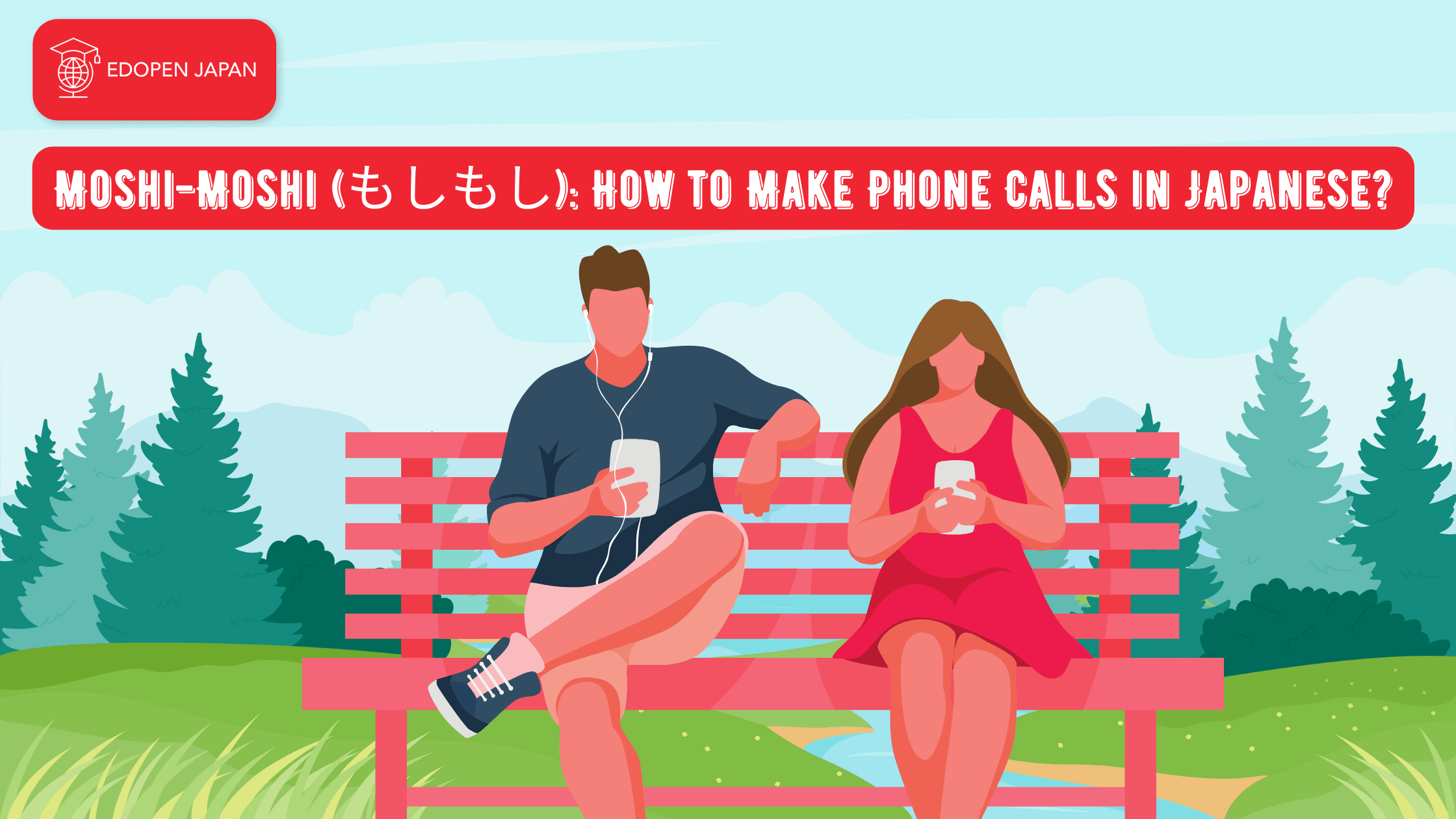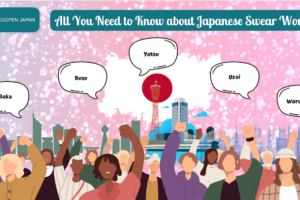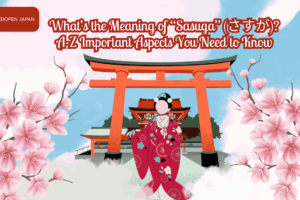Have you ever heard the interesting expression “Moshi-Moshi”? If you have ever been to Japan, you know that “Moshi-Moshi” is what Japanese people say when they answer the phone. But what does it really mean? “Moshi-moshi (もしもし) is a common Japanese phrase that Japanese people use when they answer the phone.
It is a casual greeting used for friends and family, like “hello,” but it actually means something completely different! In English, it literally means something like “to say to say” or “I speak, I speak,” but not only that. There are manners for using “Moshi-Moshi” and some reasons why “Moshi-Moshi” is most commonly used on the phone. This article will give you some great tips to keep in mind when using Moshi-Moshi.
In addition, especially for those of you who are studying and really want to explore Japanese, please also check out our reading recommendations below!
Read also:
Top 10 Free Apps for Japanese Learning
The Cutest Japanese Phrases You Need to Know
Everything You Need to Know about “ローマ字(Rōmaji)” in Japanese
Contents
What does “Moshi-Moshi” actually mean?
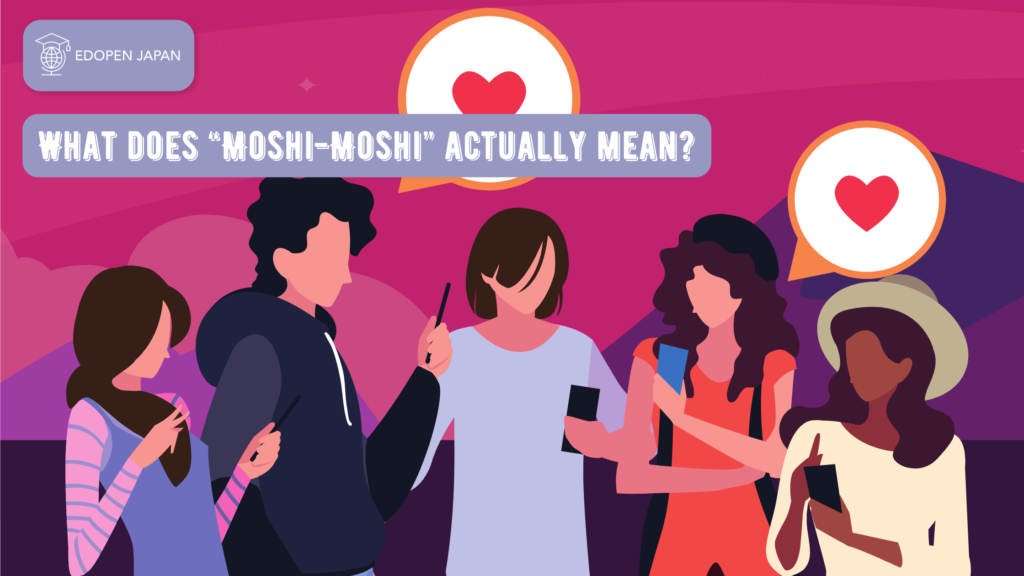
“Moshi” actually comes from the verb “mousu (申す)” which is a modest form of “to say or 言う (iu). In the Edo period, it was used in ordinary conversation when speaking to someone of higher status. Originally, the words “Moushiagemasu (申し上げます), Moushimasu (申します), or “Mousu (申す) were used.
In particular, they all mean “I will say (speak)”. Eventually it was shortened to “Moush (申し) and used to get someone’s attention, such as to say “Hey!” When you say “Moshi Moshi”, you are actually saying “I will talk” twice politely. But it feels more like “Hey, buddy!”
In short, the politeness level of conjugations is as follows:
申し上げます (Moushiagemasu) -> 申します (Moushimasu) -> 申す (Mousu)
Nowadays, Japanese people often use this expression at the beginning of their telephone conversations without thinking about the origin of the phrase.
The Origin of “Moshi-Moshi”
When you make a phone call, the Japanese say “Moshi-Moshi”. But why “Moshi-Moshi”? Telephones were first introduced in Japan on December 16, 1890. Today, this date is the Telephone Day (Denwa no Hi 電話の日) in Japan. At that time, only rich people could afford telephones.
Because they were rich, they were used to talking down to others. Therefore, the common “telephone greeting” was “Oi-Oi” [おいおい] or “Hey YOU!” The person on the other end would respond with “Hai, you gozaimasu” [はい、ようございます] or “Hai, you gozansu” [はい、ようござんす]. Both are a modest way of saying “Yes, I am ready,” which means that the caller is ready to talk.
However, at that time the performance of the phone is poor, and “Moushi-Moushi” is used to say “explanation” that “I will say it” and is shortened to “Moshi-Moshi”. This woman’s word was used repeatedly, it shrank to “Moshi-Moshi.
“Moshi-Moshi” was established around 1893 (Meiji 26). As usual, men said “Oi-Oi,” but women said “Moshi-Moshi,” the short form of “Moushi-Moushi,” and both men and women came to say “Moshi-Moshi. It is said that around 1902 (Meiji 35), the number of male telephone operators decreased, and most of them are now mainly female telephone operators.
Why do we say “Moshi” twice?
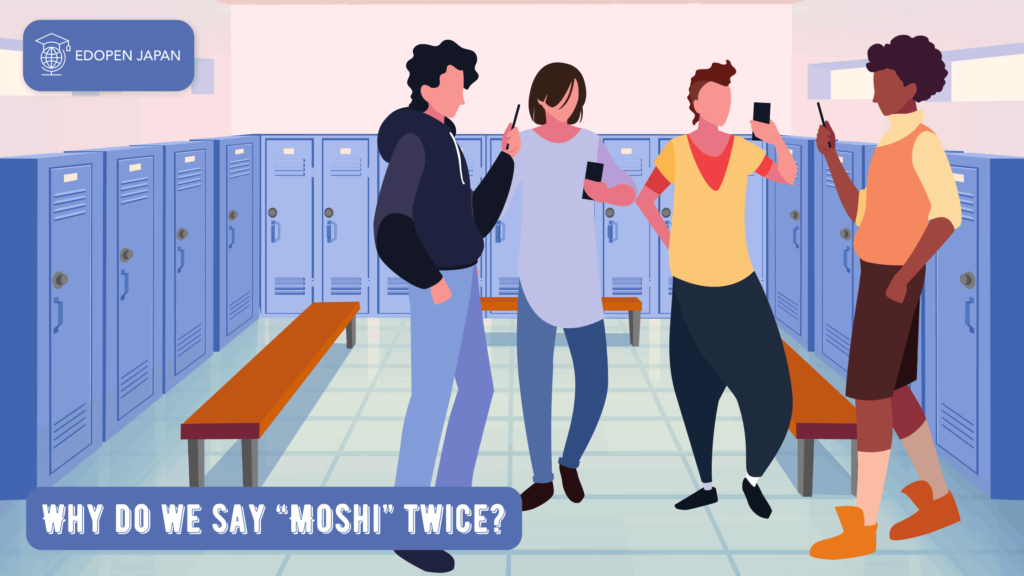
“Moshi” in “Moshi-Moshi” is an abbreviation for “I say” and is repeated twice. It is said that the reason for this repetition is that you want to prove that you are not a spirit [youkai]. A long time ago, there was a theory that ghosts [youkai] were only called once when they spoke to humans. Although one person was called only once, he said that he was killed by a ghost (Youkai) when he answered.
For this reason, it was decided that people working in the mountains should always call each other twice in a row. Since the phone does not know who the other person is, it is likely that he repeated the same thing twice as “Moshi-Moshi” to prove that he was not a ghost. Due to the influence of the legend, it is still common to say “Moshi-Moshi” on a phone where the other person cannot be seen.
When Japanese use “Moshi-Moshi”?
“Moshi-Moshi” is only used to answer the phone. The only exception you might see in a face-to-face conversation is to ask someone if they are still listening, as a sort of “Hello? Is anyone there?” You should use “Moshi-Moshi” primarily when answering the phone.
But only when you receive a call from friends or family. If there is a long pause or disconnection during the call, you can use “Moshi-Moshi” to make sure the person is still on the line (again, only if the call is from a friend or family member).
For example, if your friend’s voice becomes slurred, you can say “Moshi-Moshi kikoemasuka? “もしもし聞こえますか?” which means “Hello, can you hear me? This is how you will use Moshi-Moshi 90% of the time.
If you are answering the phone and it is someone other than family or friends on the other line, do not say “Moshi-Moshi”. There are other words to use. We will get to those later. That is, if you’re answering a call from your manager or boss, it’s better to say hai (はい), which means a polite “yes.
Other phrases you need to know when calling in Japanese
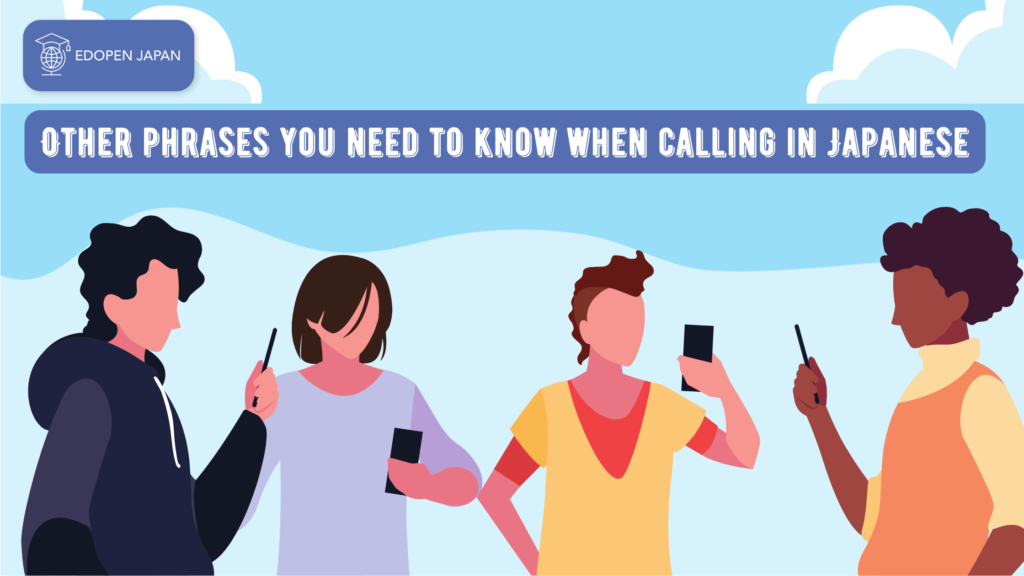
When you make a phone call, you usually say “hello. However, it is rude to say “Moshi-Moshi” in a business setting because it is a casual expression and gives the impression that you are looking down on someone. “Moshi-moshi” is only used for casual phone calls.
So what should we say in a business situation? There are several phrases that will help you in a business call situation. You can use the following phrases. When answering a call at the company, “Odenwa arigatougozaimasu” [Thank you for calling], in the first voice. Also, it is good manners not to use “Moshi-Moshi” when making a call from here, such as “I’m sorry for being busy.
1. Say はい – Hai (Yes)
The easiest and safest way to answer the phone is to say “Hai” [はい]. It means “yes,” but on the phone it serves the same function as “hello. Just remember to identify yourself and your company right after that.
Example:
はい、××会社でございます。
Hai, xx (company name) de gozaimasu.
Yes, this is xx (company name).
はい、××会社のコウイチです。
Hai, xx (company name) no Kouichi de gozaimasu.
Hello, this is Kouichi from xx company.
2. Use “です (desu)” & “ます (masu)” form for politeness
Japanese people usually use their family names on the phone. A more polite form of “です” would also be preferred. You would use “Moushimasu” [申します], the humble form of “say,” after your name. But only use it when introducing yourself to someone for the first time, as it is strange to use “Moushimasu” when talking to someone who knows you well.
However, if you are calling a company that you have called many times before, it is still appropriate to use “Moushimasu”. This is because you do not know who will receive the call, so using “Moushimasu” is a polite way to introduce yourself to the person who will receive your call.
Example:
はい、スズキ株式会社でございます。
Hai Suzuki-kabushikigaisha de gozaimasu.
Hello, this is Suzuki Co., Ltd.
スズキ 株式会社のどなたですか?
Suzuki-kabushikigaisha no donata desuka?
Who am I speaking to?
佐藤と申します / 佐藤太郎と申します。
Sato to moushimasu or Satou Taro to moushimasu.
This is Satou or This is Taro Satou.
When asked to identify yourself, especially if your last name is common, it may be more polite to give your full name.
3. Don’t forget to say: “Thank you for calling” in Japanese
Another way to answer the phone is to thank the person who called with “Odenwa arigatou gozaimasu (お電話ありがとうございます). This means “Thank you for calling”.
Example:
お電話ありがとうございます。株式会社Aの山田でございます。
Odenwa arigatougozaimasu, Kabushikigaisha A no Yamada de gozaimasu.
Thank you for your call. This is Yamada at A Co., Ltd.
Depending on the company, “Kabushikigaisha” (Co., Ltd.) may come before or after the company name. The correct pronunciation of a company name is important in Japanese culture. It’s considered rude to mispronounce a company name, even if it’s just the “Co., Ltd.” part.
3. Say: “I appreciate all you have done for us” in Japanese
You can also go one step further and thank the caller for everything he or she has ever done. The phrase is “いつもお世話になっております (Itsumo osewa ni natte orimasu)” or “お世話になっておりま (Osewa ni natte orimasu)”. Use these two on the phone in business situations.
Example:
お世話になっております。ベーコンピザ渋谷店の伊藤でございます。
Osewaninatteorimasu. Bacon Pizza no Ito degozaimasu.
I appreciate all you have done for us. This is Itou at Bacon Pizza, Shibuya branch.
4. Mention “I have received this forwarded call” as well in Japanese
If you receive a forwarded call in a business situation, say “Oddenwa kawarimashita” [お電話かわりました]. If it’s a casual conversation, you can just say, “Moshi-Moshi [もしもし] [name]です. If a call is transferred, the caller already knows the company and the call has been transferred to you.
So just say your name. However, if the call was transferred from another department, you may want to say your department name and your name.
Example:
お電話かわりました。渡辺でございます。
Odenwa kawarimashita. Watanabe de gozaimasu.
I have received this forwarded call. This is Watabane.
5. Say “Pardon me..”
As I mentioned earlier, you can use “Moshi-Moshi” on the phone when there’s a long silence or you can’t hear the person on the other line. But this is not okay for business situations. Instead, say “Osoreirimasu” [恐れいります], which means “Excuse me. After that, say that you have trouble hearing. But do it indirectly.
Use “Telephone seems to be distant”, which is “Odenwa ga tooi you desu” お電話が遠いようです. That way, it is no one’s fault. The phone just went far away.
Example:
恐れいります。お電話が少々遠いようなのですが、もう一度お願いします。
Osoreirimasuga. Odenwa ga tooiyounonodesuga, Mouichido onegaishimasu.
Pardon me. The telephone seems to be distant. Could you say that again, please?
“Moshi-moshi” is not just a simple word, but there are interesting backgrounds and manners. Please keep the above things in mind and I hope these tips will help you a lot when you come to Japan!
Summary
Finally, let’s review the topic of Moshi-Moshi (もしもし): How to make phone calls in Japanese? this time with a few points below!
- “もしもし (Moshi-Moshi)” means “I’m going to talk” and is usually used in a phone conversation. “もし (Moshi)” actually comes from the verb “Mousu (申す)”, which is a humble form of “to say”, and after 1893, “Moshi-Moshi”, this short phrase of “Moushi-Moushi” was started to be used.
- Please note that it is rude to say “もしもし (Moshi-Moshi)” in a business setting because it is a casual expression and gives the impression that you are looking down on someone.
- When answering a call at the company, you can say “お電話ありがとうございます (Odenwa arigatougozaimasu)”, いつもありがとうございます (Itsumo arigatou gozaimasu) and お世話になっております (Osewa ni natte orimasu). Please check the meaning above.

